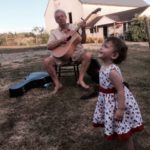
Before I go on, I have to tell you something about my granddaughter.
No, no! I know, but I really have to tell you!
She sings opera. No, not like the kinder whizzes on the internet who stun you by singing ‘O Mio Bambino Caro’. She sings about the things happening in her day, the things she likes, what she feels, what she sees. She improvises. It’s a kind of arioso (“a light airy melodic commentary”), like a recitative but more musical and without the repetitions. We sing together or take turns. And she dances.
She has danced since she was only able to sit in her infant seat, rocking her body and waving her arms to the music of the French children’s songs her mother sang to her. When she could stand and then walk she danced to anything with intrinsic music—music itself, the rhythm of a dishwasher, the light dancing in the pool at the rose garden. All of life’s rhythms inspire some joyous response in her bones, in her cells. At her grandpa’s sixty-fifth birthday, when she was not yet two, she danced for hours in the middle of the living room, first to the guitarist playing in the corner, then to the recorded music, then to the rhythm of conversation and laughter, a spirit delighting in herself and the elation of music and movement. Now at three, when, yesterday, she was invited to a rock music fest, she danced with everything she has, swaying her hips, moving her feet in time with the music, ignoring everything else. Then she sang about it all the way home.
Her mother called us last night to pass on the joy of it all, her father and Lina playing in the background. Lina got on the phone and we talked about the apples, grapes and plums we had sent home with her a few days ago. She reported she had eaten them all. Then she asked, “How are you doing, Baba? What did you do today?” A rosy heat suddenly glowed like a wood stove fire being lit in my chest, the same sensation I remember from so many moments when my daughter was little, the sense that laughter, barely suppressible, was bubbling up from somewhere deep in my chest, driven by the delight that springs up from surprise, fed to some ridiculous degree by love. I told her about writing and working in the garden. “Wow!” she said. “I love you,” we told each other. She
A rosy heat suddenly glowed like a wood stove fire being lit in my chest, the same sensation I remember from so many moments when my daughter was little, the sense that laughter, barely suppressible, was bubbling up from somewhere deep in my chest, driven by the delight that springs up from surprise, fed to some ridiculous degree by love. I told her about writing and working in the garden. “Wow!” she said. “I love you,” we told each other. She asked “What are you doing now?” I explained we were sitting at the dining room table and Grandpa was trying out his new Fitbit that told him how fast his heart was beating. “Why?”, she asked. Walter replied, “Because he likes to.” She said, “I want to talk to Grandpa.” “What are you doing, Grandpa?” “Why do you need to know about your heart?” By this time, all four of the adults on both sides of the phone connection were feeling something like the people seated around the tea table in the scene in Mary Poppins when the table rises with each new crescendo in their laughter. Somehow we were managing, just barely, to keep our faces composed. We knew that if we didn’t use our best
By this time, all four of the adults on both sides of the phone connection were feeling something like the people seated around the tea table in the scene in Mary Poppins when the table rises with each new crescendo in their laughter. Somehow we were managing, just barely, to keep our faces composed. We knew that if we didn’t use our best grown-up restraint there would certainly be a stern, “Don’t laugh at me! It’s not funny!” which we would have to then say was true, even though we knew her entire being points directly to the real source of laughter.
Walter handed me the phone with a shrug and a smile and I, to distract her from her vigorous line of questioning which we struggled to make out over the phone, asked if she could sing me a song.
“Which song?” she replied.
From the room on the other end of the phone I heard her mother say,
“Your own song. The kind you make up.”
Prompted, she began her opera. It went on for some time, about the dancing, and the apples, and her mommy and her daddy, playing soccer (she can already dribble down the field and kick a ball dropped onto her feet), her grandpa and everything. I wandered from room to room for awhile on speaker phone so Walter could hear.
We had to distract her again to end the song or it would have gone on and on into the night. It would have been a wonder, but even flowing brooks need to come to rest for awhile in quiet pools.
Tomorrow I will tell you stories about other grandmothers, connected as they are.

